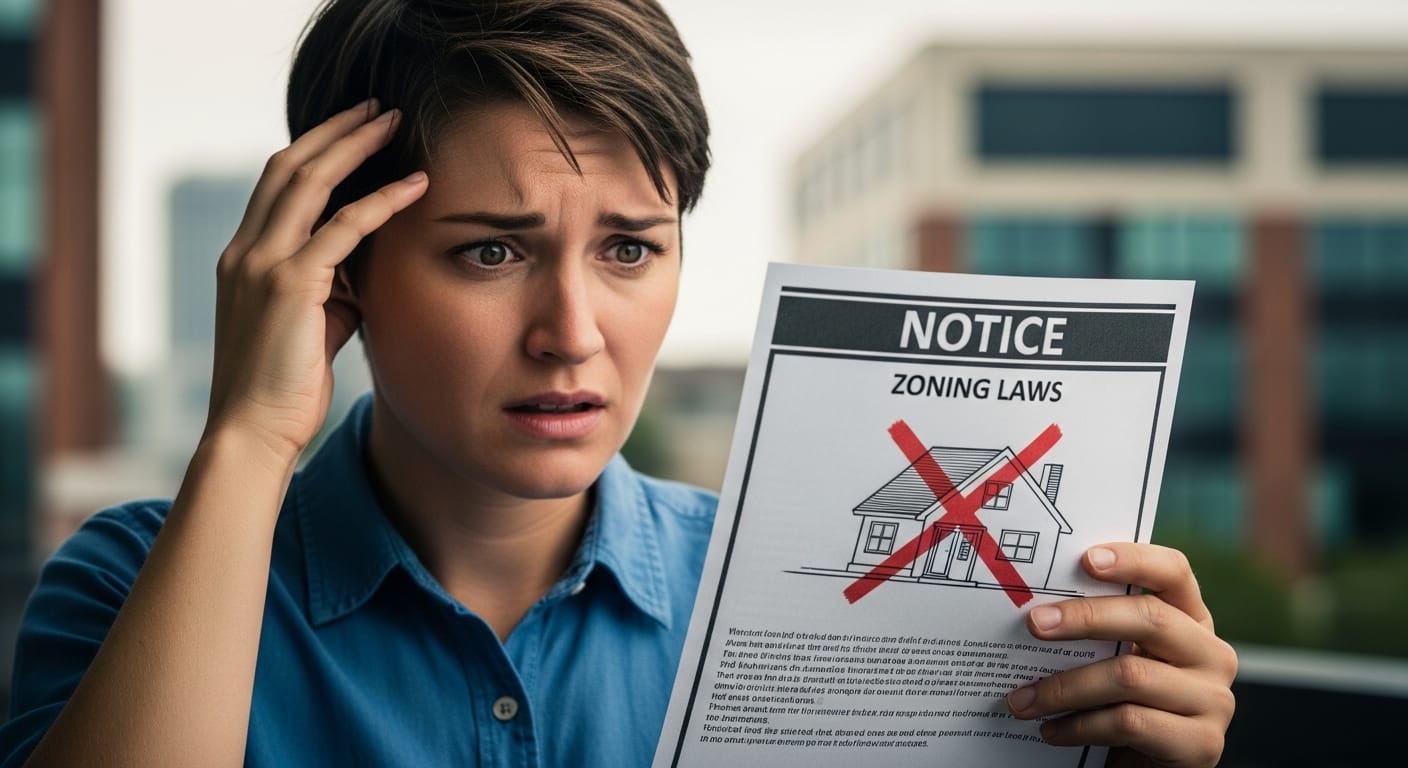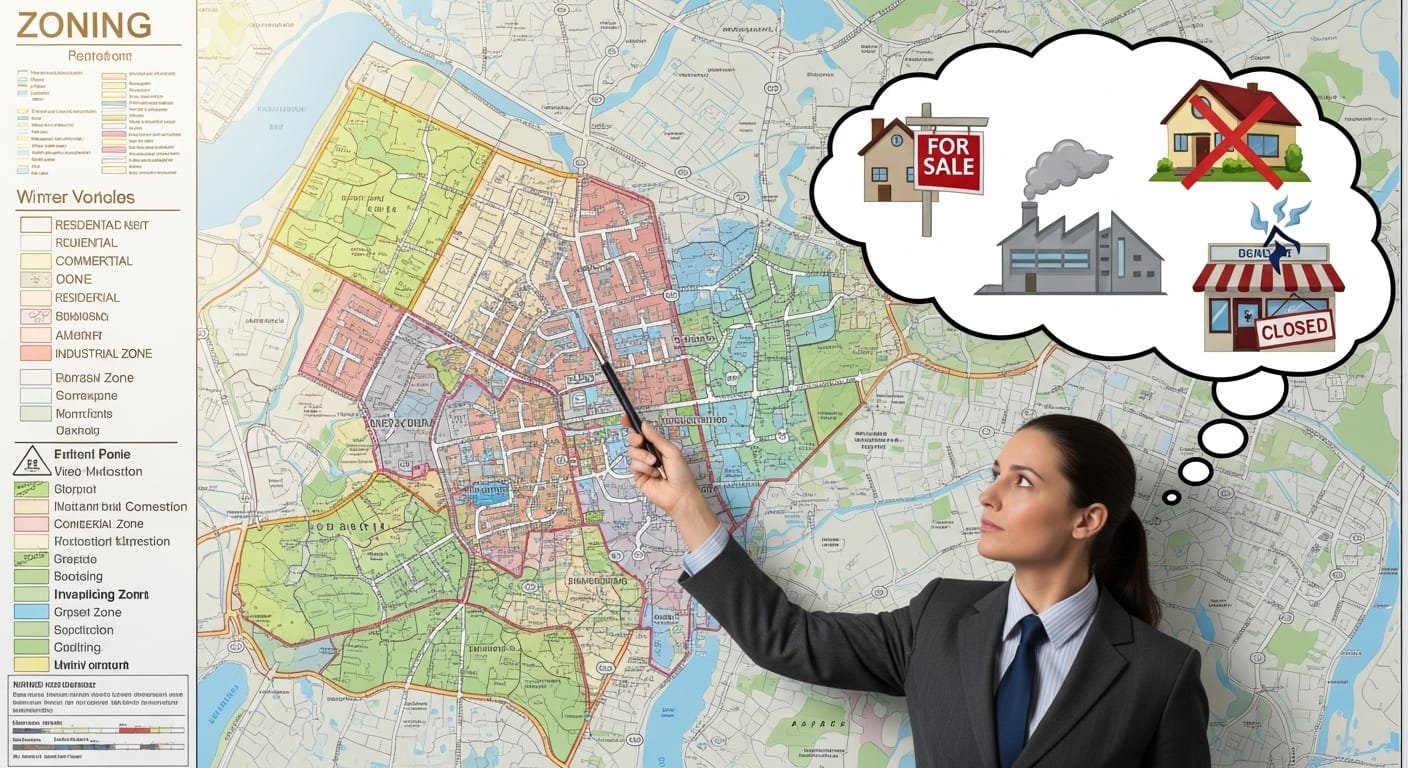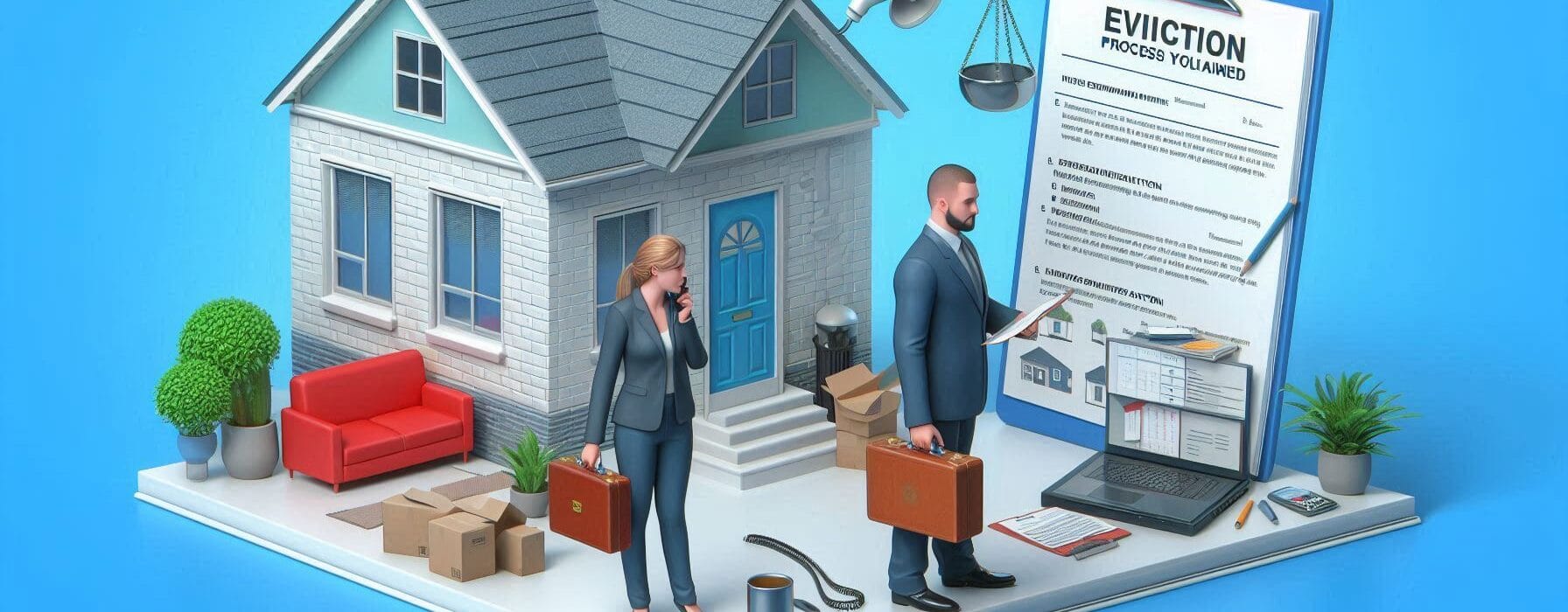Please Note: This post may contain affiliate links. If you click one of them, we may receive a commission at no extra cost to you. As an Amazon Associate, I earn from qualifying purchases.
Zoning issues. Even saying it aloud sounds like something out of a municipal horror film. You’ve got your dream project in mind—whether it’s a backyard pool, a cozy coffee shop, or the world’s most ambitious treehouse—and suddenly, the zoning board swoops in to tell you no.
It’s like planning the perfect party only to have the neighbors complain about your music before you’ve even hit play.
Zoning laws are those invisible lines that dictate what you can and can’t do with your property. They’re designed to keep things orderly, sure, but they also have a way of feeling like they’re personally out to ruin your day. Fortunately, zoning challenges are navigable if you know your rights and your options.

Top Takeaways and Key Concepts
Understand Zoning Basics: Learn your property’s zoning classification and permitted uses before planning projects.
Identify the Specific Issue: Determine whether the problem is a misinterpretation, missing permit, or regulation conflict.
Check Local Ordinances: Research municipal zoning rules through official government sources, not just online searches.
Seek Variances or Rezoning: Apply for variances for small exceptions or rezoning for larger property use changes.
Engage Professionals and Neighbors: Hire a zoning attorney if needed and address neighbors’ concerns proactively.
Summary of This Article
The article explains how to navigate zoning challenges for property projects. It emphasizes understanding local zoning laws, identifying the specific issue, and checking official ordinances. For projects that conflict with current rules, applying for variances or rezoning can provide legal solutions, though community support may be required. Preparing for public hearings, engaging neighbors, and hiring a zoning attorney are recommended strategies to increase approval chances and resolve disputes effectively.
Understanding the Basics of Zoning

Let’s start with the obvious: zoning laws can feel like a giant puzzle, except the pieces are scattered across city council meetings, legal jargon, and bylaws. At their core, zoning laws regulate land use.
They determine whether a property can be used for residential, commercial, industrial, or mixed purposes. For instance, if you want to open a petting zoo in the middle of a suburban neighborhood, zoning laws might have a few things to say about it.
On the other hand, these laws aren’t all bad. They ensure neighborhoods stay cohesive, prevent noisy factories from popping up next to schools, and protect property values. Of course, when they conflict with your plans, it’s hard to see the silver lining.
Interestingly enough, zoning categories aren’t set in stone. They can be amended or changed, but doing so often feels like trying to move a mountain with a teaspoon.
Identifying the Problem
Before you can fix a zoning issue, you need to figure out exactly what’s going wrong. Is it a matter of misinterpreted regulations? Are you dealing with a zoning board that’s not exactly flexible? Maybe there’s a permit you missed. Whatever the case, start by getting clear on the nature of the problem.
To be fair, zoning boards aren’t out to make your life miserable (usually). Their job is to enforce the rules, not to squash your dreams. If you approach them calmly and with all your facts in order, you might be surprised at how cooperative they can be.
Checking Local Ordinances
Here’s a fun fact: not all zoning rules are created equal. They vary widely from city to city, and sometimes even from one block to the next. That means the first thing you need to do is dive into your local ordinances.
By the way, don’t rely on Google for this. Visit your local government’s website or zoning office to get the most accurate and up-to-date information. Sure, it might feel like studying for a pop quiz you didn’t ask for, but trust me, it’s worth it.
Seeking a Variance
If your project doesn’t align with current zoning laws, all is not lost. Enter the magical world of variances. A variance is essentially a hall pass that allows you to bypass specific zoning rules. For example, if your dream garage is six inches too tall, a variance might let you build it anyway.
On the other hand, variances aren’t handed out like candy. You’ll need to make your case to the zoning board, showing that your project won’t harm the community or violate the spirit of the zoning laws. It’s a bit like convincing your teacher to let you turn in homework late—you’ll need a good reason.
Exploring Rezoning
For larger-scale issues, rezoning might be the solution. Rezoning involves changing the classification of your property to allow for a new use. This is a more complicated process, but it can open up long-term possibilities for your land.
Interestingly enough, rezoning often requires support from your community. This means attending public hearings, gathering signatures, and convincing your neighbors that your plans are worth supporting. It’s like a mini political campaign, only without the attack ads.
Hiring a Zoning Attorney
Sometimes, zoning battles are just too complex to handle alone. That’s where zoning attorneys come in. These legal experts specialize in land use and can help you navigate the maze of regulations, applications, and hearings.
Honestly, having a zoning attorney on your side can make all the difference. They know the language, the players, and the strategies to get things done. Plus, they can save you from making costly mistakes along the way.
Preparing for Public Hearings
If you’re applying for a variance or rezoning, chances are you’ll need to attend a public hearing. These meetings are where decisions are made, so preparation is key. Bring visual aids, know your talking points, and be ready to answer questions.
Speaking of which, don’t forget to practice your poker face. Public hearings can be nerve-wracking, but staying calm and confident goes a long way.
Resolving Disputes with Neighbors
Zoning issues often have a way of dragging your neighbors into the mix. Maybe they’re concerned about noise, traffic, or how your plans will affect their property values. Whatever the case, open communication is essential.
All things considered, it’s easier to address concerns early than to let them fester. Invite your neighbors over for coffee (or, let’s be real, wine) and talk through the issues.
Knowing When to Appeal
If your application is denied, don’t panic. Most zoning decisions can be appealed. This is your chance to present new evidence, clarify misunderstandings, or simply make a better case.
On the other hand, appeals can be time-consuming and expensive, so weigh your options carefully. Sometimes, it’s better to revise your plans and try again.
Resources
Understanding Land Use and Zoning Laws
http://www.landusebasics.org/zoning-laws
How to Apply for a Zoning Variance
http://www.varianceguide.net/apply-variance
Navigating Public Hearings for Zoning Issues
http://www.zoninghearings.org/public-hearings
Frequently Asked Questions
What are zoning laws and why do they matter?
Zoning laws regulate how land can be used, determining whether a property is residential, commercial, industrial, or mixed-use. They help maintain order and protect property values.
How can I find out my property’s zoning classification?
You can check zoning maps and ordinances on your local government’s website or by contacting the zoning department directly for accurate and updated information.
What should I do first if I encounter a zoning issue?
Identify the specific problem, such as a misinterpreted rule or missing permit, and gather all related documents before contacting the zoning board or seeking professional advice.
What is a zoning variance and when is it needed?
A variance allows exceptions to zoning rules for unique property situations, such as minor size or setback differences, without changing the overall zoning classification.
How does rezoning differ from a variance?
Rezoning changes the property’s classification entirely, allowing new uses. It’s a longer process that often requires public hearings and community support.
Should I hire a zoning attorney for my case?
Yes, if your zoning issue is complex or involves hearings, a zoning attorney can help interpret laws, prepare applications, and represent you effectively before local boards.
Can I appeal a denied zoning request?
Yes. Most zoning decisions can be appealed by presenting new evidence, correcting errors, or clarifying information to strengthen your case before the appeals board.

Kevin Collier is a legal expert passionate about simplifying complex legal concepts for everyday individuals. With a focus on providing clear, practical information, he covers a wide range of topics, including rights, responsibilities, and legal procedures. Kevin aims to empower readers with the knowledge they need to navigate the legal landscape confidently, ensuring they can make informed decisions regarding their legal matters. Through insightful articles and easy-to-understand resources, he helps demystify the law, making it accessible to all.










